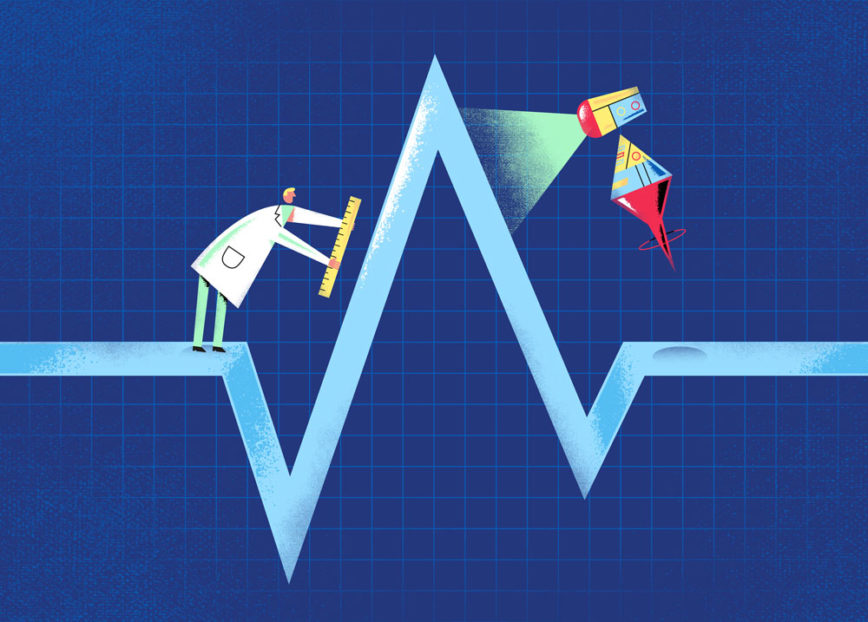In a world where rapidly developing Artificial Intelligence (AI) is entering more spheres of life, questions about its use are beginning to arise. With ongoing changes in the job market, many employees across various industries—including healthcare—are beginning to feel the impact. One notable shift is the increasing use of AI to analyse medical data and accelerate the work of specialists.
However, an important question arises: will AI be able to replace healthcare professionals, as it has in some other industries where automation has effectively eliminated the human factor? And would this be a responsible approach in an area that directly affects patient care and outcomes?
One area where this shift is already happening is the analysis of ambulatory ECG (Holter) tests. AI is able to speed up and automate the processes involved in analysing those examinations, which, with approximately 80,000 to 120,000 heartbeats per day, are time-consuming when assessed manually. Yet in healthcare, efficiency must go hand in hand with reliability. A study involving 82 patients and 100 seven-day ECG tests compared the effectiveness of AI analysis with that performed by cardiologists. The correlation between AI and cardiologists’ detection of atrial fibrillation (AF) was shown to be 99.8%, proving that AI may do things faster with the same quality as specialists (Hennings et al., 2023). It is therefore valid to ask whether the human factor in ambulatory ECG tests analysis is still necessary.
Although various scientific studies indicate the reliability of AI applications in a Holter ECG test’s analysis, artificial intelligence should not be the sole entity responsible for analysing ECGs and making diagnoses, because even highly trained AI systems may produce false positives or overlook critical anomalies. However, AI can automate tasks that are still performed manually by medical professionals—e.g. clearing artefacts or analysing tens or even hundreds of thousands of beats one by one. As a result, this may lead to greater efficiency in analysis and reporting, potentially shortening patients’ waiting times for diagnosis. Moreover, artificial intelligence can also prove helpful in addressing the shortage of specialised medical staff, allowing the same number of personnel to analyse ambulatory ECG tests in a shorter period.
Artificial intelligence (AI) is a powerful tool that, when used appropriately, can significantly assist the medical sector, especially in the field of cardiology. However, it will not fully replace the work of a qualified specialist. Therefore, it is crucial that ambulatory Holter ECG analysis software, that use AI algorithms, provides the highest possible quality of results and automates activities that, in traditional systems, require tedious manual work. Such implementation can significantly speed up the work of clinicians, contribute to more precise reports and diagnoses, and reduce waiting times for specialist consultations.
Cardiomatics is an artificial intelligence (AI)-based, cloud-based medical grade software (CE/MDR) for analysing Holter ECG studies. The system uses clinically validated AI algorithms to provide accurate and high-quality results. Thanks to the automation and state-of-the-art user experience, including an interactive Ambulatory (Holter) ECG report panel, specialists in hospitals, as well as Ambulatory Specialised Care and Primary Care facilities, can reduce their time spent on analysis up 80% and patient waiting time for diagnosis by 36%.
The solution is currently used by several hundred medical facilities in 10 countries around the world, including the University Hospital of Basel, Cornell University and American Heart of Poland.
(Find out more) https://cardiomatics.com/solutions/for-clinics/
Bibliography:
Hennings, E., Coslovsky, M., Paladini, R. E., Aeschbacher, S., Knecht, S., Schlageter, V., Krisai, P., Badertscher, P., Sticherling, C., Osswald, S., Kühne, M., Zuern, C. S., & Swiss-AF Investigators (2023). Assessment of the atrial fibrillation burden in Holter electrocardiogram recordings using artificial intelligence. Cardiovascular digital health journal, 4(2), 41–47. https://doi.org/10.1016/j.cvdhj.2023.01.003

